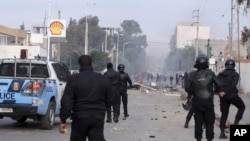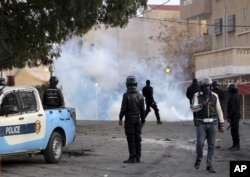Tunisia imposed a nationwide overnight curfew Friday in response to growing unrest over unemployment as protests across the country descended into vandalism in several cities.
The curfew from 8 p.m. until 5 a.m. would begin Friday because the attacks on public and private property "represent a danger to the country and its citizens," the Interior Ministry said. The previous night, police stations came under attack and security officers used tear gas to repel protesters armed with stones and Molotov cocktails.
In housing projects on the outskirts of the capital, Tunis, roving groups of young people pillaged a bank and looted stores and warehouses.
Tunisia's prime minister, Habib Essid, was cutting short a visit to France to deal with the protests, which were triggered Sunday when a young man who lost out on a government job climbed a transmission tower in protest and was electrocuted. Tunisia's unemployment stands around 15 percent, but is 30 percent among young people.
"Are we not Tunisians too? It's been four years I've been struggling. We're not asking for much, but we're fighting for our youth. We struggled so much for them," said Leila Omri, the mother of an unemployed graduate in Kasserine.
Tunisia has been under a state of emergency since a suicide bombing in November killed 12 members of the presidential guard in the heart of Tunis - an attack that capped an unusually violent year for Tunisia. That bombing, as well as attacks earlier in the year against the Bardo museum and the tourist beach town of Sousse, were claimed by the Islamic State group.
The suicide five years ago of another unemployed youth set off a popular uprising that overthrew Tunisia's longtime ruler Zine El Abidine Ben Ali, and eventually gave rise to the "Arab Spring" uprisings across North Africa.
In an interview in Paris just before his government imposed the curfew, Essid denied the context of the two deaths was comparable.
"Tunisia has completely changed from a dictatorship to a young democracy. You know during youth there are periods of adolescence that you have to get through," he told France 24 television. "We have a difficult job and we are aware of the difficulty."
Tourism, a main driver of Tunisia's economy, plummeted after the attacks, leaving even the relatively prosperous coastal areas struggling.





